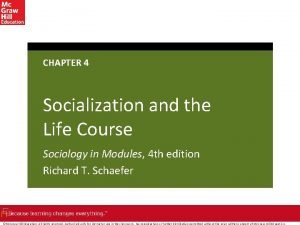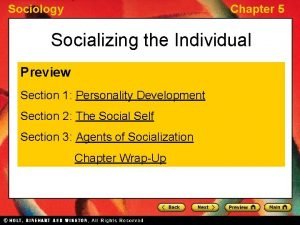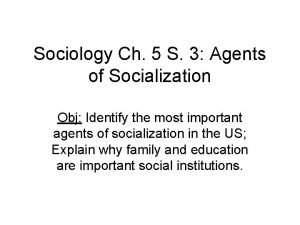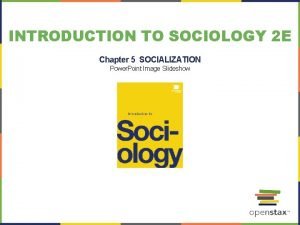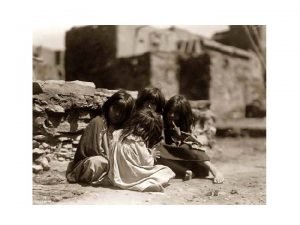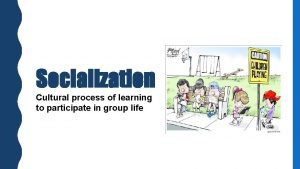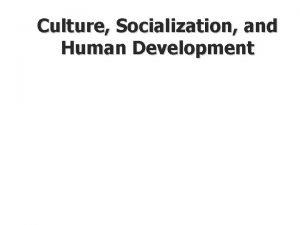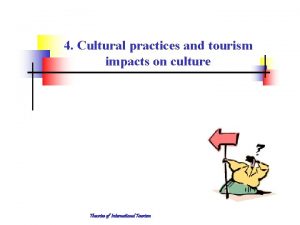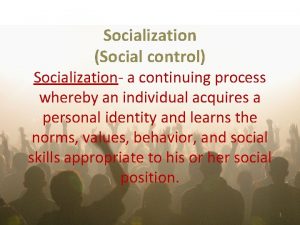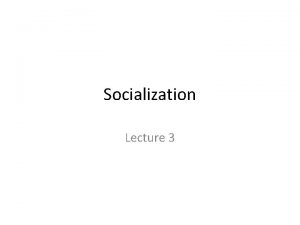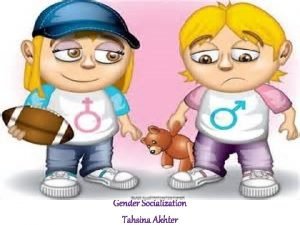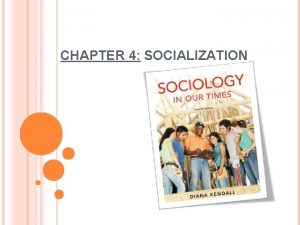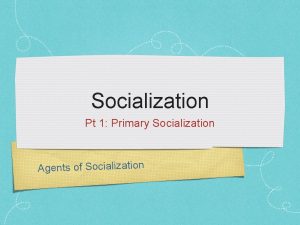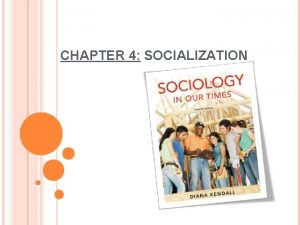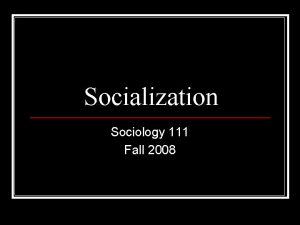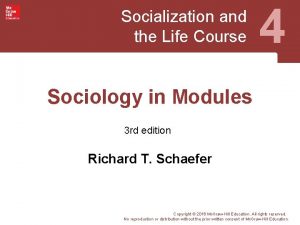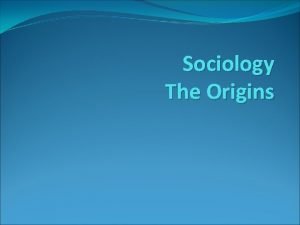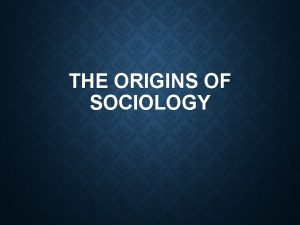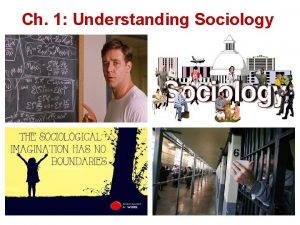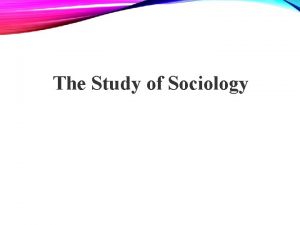4 Socialization and the Life Course Sociology A




























































- Slides: 60

4: Socialization and the Life Course Sociology: A Brief Introduction, 12 th edition Richard T. Schaefer

Inside: • • • The Role of Socialization The Self and Socialization Agents of Socialization throughout the Life Course Role Transitions throughout the Life Course Social Policy and Socialization: Child Care around the World

The Role of Socialization • It is the interaction between environmental factors (nuture) and biological inheritance (nature) that is important in human development. Continuing and lifelong socialization process involves many different social forces that influence people’s lives and alter their self-images Most important of these in the U. S. is family http: //psychrod. com/nature-vs-nurture-a-a -gender-debate-on-gender-differences/ https: //www. youthvoices. live/2018/02/22/nature-is-nurture/

What is Socialization? • Socialization: lifelong process in which people learn the attitudes, values, and actions appropriate to individuals as members of a particular culture Personality: person’s typical patterns of attitudes, needs, characteristics, and behavior Agents of Socialization • Family • School • Peer Groups • Work Place • The State • Mass Media

Nature vs. Nurture • Studies of Identical Twins --Intelligence tests show similar scores when twins are reared apart in roughly similar social settings. --Intelligence tests show quite different scores when twins are reared apart in dramatically different social settings. --Social Scientists emphasize an interaction between biological and environmental factors (socialization)

Social Environment: The Impact of Isolation • Extreme Isolation: Isabelle • Extreme Neglect: Romanian Orphans • Primate Studies – Social attachments develop from need for warmth, comfort, and intimacy

The Influence of Heredity • Minnesota twin family study – Twins have similar intelligence test scores when reared apart in roughly similar social settings – Different scores when reared in different social settings

What is Socialization? • The family is the primary agent of socialization. • Socialization by the family begins shortly after birth. • Socialization is typically, but not always, positive. • Video Clip: • Big Daddy

Agents of Socialization (Continued) • Family – Gender roles: expectations regarding proper behavior, attitudes, and activities of males and females • School – Teaches values and customs of larger society – Can also reinforce divisive aspects of society • Peer Group – As children grow older, peer groups increasingly assume role of Mead’s significant others – Gender differences are noteworthy among adolescents

• Short Film Excerpt: Big Daddy • Parent/Guardians as important agents of socialization at a young age.

BARENAKED LADIES LYRICS "What A Good Boy" • • When I was born, they looked at me and said what a good boy, what a smart boy, what a strong boy. And when you were born, they looked at you and said, what a good girl, what a smart girl, what a pretty girl. We've got these chains that hang around our necks, people want to strangle us with them before we take our first breath. Afraid of change, afraid of staying the same, when temptation calls, we just look away. [Chorus] This name is the hairshirt I wear, and this hairshirt is woven from your brown hair. This song is the cross that I bear, bear it with me, bear with me, be with me tonight, I know that it isn't right, but be with me tonight. I go to school, I write exams, if I pass, if I fail, if I drop out, does anyone give a damn? And if they do, they'll soon forget 'cause it won't take much for me to show my life ain't over yet. I wake up scared, I wake up strange. I wake up wondering if anything in my life is ever going to change. I wake up scared, I wake up strange and everything around me stays the same. http: //www. azlyrics. com/lyrics/barenakedladies/whatagoodboy. html [Chorus] I couldn't tell you that I was wrong, chickened out, grabbed a pen and paper, sat down and I wrote this song. I couldn't tell you that you were right, so instead I looked in the mirror, watched TV, laid awake all night. We've got these chains, hang 'round our necks, people want to strangle us with them before we take our first breath. Afraid of change, afraid of staying the same when temptation calls. . . [Chorus] When I was born, they looked at me and said; What a good boy, what a smart boy, what a strong boy. And when you were born, they looked at you and said; what a good girl, what a smart girl, what a pretty girl, hey

• Billy I wonder what he'll think of me I guess he'll call me the "old man" I guess he'll think I can lick Ev'ry other feller's father Well, I can! I bet that he'll turn out to be The spittin' image of his dad But he'll have more common sense Than his puddin-headed father ever had I'll teach him to wrestle And dive through a wave When we go in the mornin's for our swim His mother can teach him The way to behave But she won't make a sissy out o' him Not him! Not my boy! Not Bill! Bill. . . My boy Bill I will see that he is named after me, I will. My boy, Bill! He'll be tall And tough as a tree, will Bill! Like a tree he'll grow With his head held high And his feet planted firm on the ground And you won't see nobody dare to try To boss or toss him around! No pot-bellied, baggy-eyed bully Will boss him around. I don't give a hang what he does As long as he does what he likes! He can sit on his tail Or work on a rail With a hammer, hammering spikes! He can ferry a boat on a river Or peddle a pack on his back Or work up and down The streets of a town With a whip and a horse and a hack. • He can haul a scow along a canal Run a cow around a corral Or maybe bark for a carousel Of course it takes talent to do that well. • Aha-ha-ha-ha! He might be a champ of the heavyweights, Or a feller that sells you glue, my boy bill Or President of the United States, http: //www. stlyrics. com/lyrics/car That'd be all right, too His mother would like that ousel/soliloquy. htm But he wouldn't be President if he didn't wanna be! Not Bill! My boy, Bill! He'll be tall And as tough as a tree, will Bill Like a tree he'll grow With his head held high And his feet planted firm on the ground And you won't see nobody dare to try To boss him or toss him around! No fat-bottomed, flabby-faced, Pot-bellied, baggy-eyed bully Will boss him around. And I'm hanged if he'll marry his boss' daughter A skinny-lipped virgin with blood like water Who'll give him a peck And call it a kiss And look in his eyes through a lorgnette. . . Hey, why am I talkin' on like this? My kid ain't even been born, yet! I can see him when he's seventeen or so, And startin' to go with a girl I can give him lots of pointers, very sound On the way to get 'round any girl I can tell him. . . Wait a minute! Could it be? What the hell! What if he is a girl? What would I do with her? What could I do for her? A bum with no money! You can have fun with a son But you gotta be a father to a girl She mightn't be so bad at that A kid with ribbons in her hair! A kind o' sweett and petite Little tin-type of her mother! What a pair! • My little girl Pink and white As peaches and cream is she My little girl Is half again as bright As girls are meant to be! Dozens of boys pursue her Many a likely lad does what he can to woo her From her faithful dad She has a few Pink and white young fellers of two or three But my little girl Gets hungry ev'ry night and she comes home to me! I-I got to get ready before she comes! I got to make certain that she Won't be dragged up in slums With a lot o' bums like me She's got to be sheltered In a fair hand dressed In the best that money can buy! I never knew how to get money, But, I'll try! I'll go out and make it or steal it Or take it or die!

Mead: Theory of the Self and “What a Good Boy” http: //www. stlyrics. com/lyrics/carousel/so liloquy. htm --The self begins as a privileged, central position in a person’s world. --As a person matures, the self changes and begins to reflect greater concern about the reactions of others. --Significant Others: Individuals who are most important in the development of the self. --Role Taking: The process of mentally assuming the perspective of another. --Generalized Others: The attitudes, viewpoints, and expectations of society as a whole that a child takes into account.

What is Socialization? v. School • teach children the values and customs of the larger society. have traditionally socialized children into conventional gender roles : expectations of conventional gender roles proper behavior, attitudes and activities by gender.

What is Socialization? Workplace. Learningtotobehaveappropriately Workplace withinananoccupationalsettingisisa afundamental within aspectofofhumansocialization. aspect

What is Socialization? • The state has usurped many of the traditional family functions. • The state has re-instituted many rites of passage • Thestate hasre-instituted many ritesof ofpassage • The has many rites including stipulating the ages at which we are includingto: stipulatingthe theagesatatwhichwe weare including stipulating permittedto: permitted drink drive vote drink drive drink marry retire work overtime

Agents of Socialization v. Peer Group http: //www. cyh. com/Health. Topics/Health. Topic. Details. Kids. aspx? p=335&np=286&id=1822 • As children grow older, peer groups increasingly assume the role of Mead’s significant others. • can ease the transition to adult responsibilities. • can encourage children to honor or violate cultural norms and values. • Can exert pressure to conform. http: //www. kidshealth. org/teen/your_mind/relationships/peer_pressure. html

• 1. Pretend that A (in Box 2) is the same length as the bar in Box 1. 1 • 2. Pretend that A (in Box 2) is the same length as the bar in Box 1. Solomon Asch • 3. Pretend that A (in Box 2) is the same length as the bar in Box 1. • 4. Answer hesitantly and cautiously. Source: Kornblum

1 • 1. Pretend that A (in Box 2) is the same length as the bar in Box 1. • 2. Pretend that A (in Box 2) is the same length as the bar in Box 1. 2 • 3. Pretend that A (in Box 2) is the same length as the bar in Box 1. • 4. Answer hesitantly and cautiously. Source: Kornblum

2 minute video clip 1 • 1/3 of all subjects went along with the group on a majority of trials • ¼ of the group remained independent of the group on all trials 2 • The rest (5/12) conformed on a few of the trials but not on the others. • All felt pressure to conform, ill at ease, upsetting experience. Power of group conformity (Emperor’s New Clothes) • (Ash 1965 Sabini 1995) Source: Kornblum

Peer Groups • Peer groups can be a source of harassment as well as support. • Handout Lefkowitz

Table 4 -3 High School Popularity Source: Suitor et al. 2001: 445. According to college men According to college women • What makes high school girls popular? 1. 2. 3. 4. 5. Physical attractiveness Grades/intelligence Participation in sports General sociability Popularity with boys • What makes high school boys popular? 1. 2. 3. 4. 5. Participation in sports Grades/intelligence Popularity with girls General sociability Car 1. 2. 3. 4. 5. Grades/intelligence Participation in sports General sociability Physical attractiveness Clothes • What makes high school boys popular? 1. 2. 3. 4. 5. Participation in sports Grades/intelligence General sociability Physical attractiveness School clubs/government

The Self and Socialization v Sociological Approaches to the Self http: //shakespeare. palomar. edu/theatre. htm • Goffman: Presentation of the Self --Dramaturgical Approach: People resemble performers in action. --Impression Management: The individual slants the presentation of the self in order to create distinctive appearances and satisfy particular audiences. Video: Trading Places scene 4 vs 6 (notice different audiences/peer groups( 1: 30 each)

--Dramaturgical Approach: People resemble performers in action. Goffman: Presentation of the Self Valentine is aware of this and applies it. http: //www. fast-rewind. com/

--Impression Management: The individual slants the presentation of the self in order to create distinctive appearances and satisfy particular audiences. • Goffman: Presentation of the Self • Depending on the location, important to appear unthreatening? http: //dvd. ign. com/articles/372733 p 1. html? fromint=1

http: //dvd. ign. com/articles/372733 p 1. html? fromint=1

As we will see with “Doing Gender” our identities are constant works in progress and so theoretically, can be changed under the right conditions/ socialization This has implications for social regulation. Video: Trading Places scene 2, 5 (30 sec, 1 min) http: //dvd. ign. com/articles/372733 p 1. html? fromint=1

Socialization and the Life Course Two types of socialization occur throughout the life course. 1. Resocialization: The process of discarding former behavior patterns and accepting new ones as part of a transition in one’s life. https: //www. youtube. com/watch? v=a 54 y. C 1 etm. Vc&feature=youtu. be Video- Elf http: //sociologyinfocus. com/2017/12/how-to -be-human-lessons-in-socialization-fromelf/ http: //sociologyinfocus. com/tag/socializatio

Socialization and the Life Course Two types of socialization occur throughout the life course. 2. Anticipatory Socialization: The processes of socialization in which a person “rehearses” for future occupations and social relationships. Video: Trading Places Scene 11 (3 min)

Can someone be reformed? Video: Trading Places scene 13 (1: 50) (15 5 -6 min) A Clockwork Orange http: //www. geocities. com/Athens/Academy/1974/

Prisoner Re-Entry Social and Policy Implications http: //www. secondchanceprogram. org/strive_prog. html http: //www. drug-rehabs. com/

Table 4 -2 Theoretical Approaches to Development of the Self • Sociologist Charles Horton Cooley (1864– 1929, USA) Copy Cat Cooley – Looking-glass self (the self is the product of our social interactions with others); stages of development not distinct; feelings toward ourselves Mature Mead developed through interaction with others (like a mead honey wine) • Sociologist George Herbert Mead (1863– 1931, USA) – Self, continually developing and changing. ; three distinct stages of Gawking development; self develops as children grasp roles of others in their lives Goffman • Sociologist Erving Goffman (1922– 1982, USA) – Impression management; dramaturgical approach; face-work; self developed through impressions we convey to others and groups • Psychotherapist Sigmund Freud (1856– 1939, Austria) – Psychoanalysis; self influenced by parents and by inborn drives, such Freshas. Freud the drive for sexual gratification • Child psychologist Jean Piaget (1896– 1980, Switzerland) – Cognitive theory of development; four stages of cognitive development Progressive Piaget

Table 4 -1 Mead’s Stages of the Self Preparation Stage Play Stage Game Stage Self not yet present Self is developing Self is present Child imitates the actions Child takes the role of a of others single other, as if he or she were the other Child considers the roles of two or more others simultaneously Example: When adults laugh and smile, child laughs and smiles Example: In game of hide-and-seek, child takes into account the roles of both hider and seeker Example: Child first takes the role of a doctor, then the role of a patient Role taking: process of mentally assuming perspective of another and responding to that imagined viewpoint Generalized other: a child's awareness of the attitudes, viewpoints, and expectations of society as a whole

Sociological Approaches to the Self • Goffman: Presentation of the Self – Erving Goffman – Impression management: individual learns to slant presentation of self to create distinctive appearances and satisfy particular audiences – E. g. trying to act in a manner that will cause someone to like you or go out on a date with you – Also known as dramaturgical approach: people are seen as theatrical performers » Face-work: a need to maintain proper image of self to continue social interaction (avoid embarrassment in public) » E. g. leave bar alone and say ”There wasn’t anyone interesting in the entire crowd” https: //www. ai-therapy. com/blog/social-anxiety-interrupt-social-situations/

Psychological Approaches to the Self (Continued, 4) • Sigmund Freud – Self is a social product – Natural impulsive instincts in constant conflict with societal constraints – Personality influenced by others (especially one’s parents) – Self has components that work in opposition to each other

Psychological Approaches to the Self (Continued, 5) • Jean Piaget – Emphasized stages through which human beings progress as the self develops – Cognitive theory of development: four stages in development of children’s thought processes • • Sensorimotor Preoperational Concrete operational Formal operational

• Beyond here if have time

Agents of Socialization

Agents of Socialization (Continued, 2) • Mass Media and Technology – Media innovations are important agents of socialization – Concerns about teen use of Internet – Use of technology not always negative – New communication technologies in developing countries

Agents of Socialization (Continued, 3) • Workplace – Learning to behave appropriately within occupational setting is a fundamental aspect of human socialization • Religion and the State – Government and organized religion impact life course by reinstituting some rites of passage

Socialization throughout the Life Course • Rites of passage: means of dramatizing and validating changes in status • Life course approach: looking closely at social factors that influence people throughout their lives – Terms youthhood, emerging adulthood, and not quite adult coined to describe the prolonged ambiguous status that young people in their 20 s experience

Anticipatory Socialization and Resocialization • Anticipatory socialization: person “rehearses” future occupations and social relationships • Resocialization: discarding former behavior patterns and accepting new ones during transitions in one’s life

Anticipatory Socialization and Resocialization (Continued) • Total institution: regulates all aspects of a person’s life under a single authority (Goffman) • Degradation ceremony: ritual in which individual becomes secondary and rather invisible in overbearing social environment

Role Transitions throughout the Life Course • Socialization is a lifelong process – Levinson: One transitional stage begins when individual gradually enters adult world – Midlife crisis: stage in which men and women realize they have not achieved basic goals and ambitions

The Sandwich Generation • Sandwich generation: adults who simultaneously try to meet needs of their parents and their children – By 2010, 13 million Americans caring for both children and parents – Caregiving role falls disproportionately to women

Adjusting to Retirement • Phases of Retirement – – – – Preretirement Near phase Honeymoon phase Disenchantment phase Reorientation phase Stability phase Termination phase

Adjusting to Retirement (Continued) • Naturally Occurring Retirement Communities (NORCs) – When older people congregate in areas that have gradually become informal centers for senior citizens – Often emerge as singles and young couples move out and older people move in – Residents of some of these communities threatened by gentrification

Social Policy and Socialization: Child Care around the World • Looking at the Issue – In the U. S. , 88% of employed mothers depend on others to care for their children – 30% of mothers who aren’t employed have regular care arrangements – Researchers found high quality child-care centers do not adversely affect socialization of children • Few can afford to have a parent stay at home

Social Policy and Socialization: Child Care around the World (Continued) • Applying Sociology – Interactionists favor studies assessing quality of child care outside of home; micro level of analysis – High-quality day care not equally available to all families • Conflict perspective notes child care costs are burden for lower-class families • Feminist perspective questions low status and wages of child care workers

Social Policy and Socialization: Child Care around the World (Continued, 2) • Initiating Policy – Policies vary throughout the world – When policymakers decide child care is desirable, must determine degree to which taxpayers subsidize it

Sociology on Campus (Impression Management) • 4 -1 Impression Management by Students – How do you react to those who have received higher or lower grades than you? Do you engage in impression management? How would you like others to react to your grade? – What social norms govern students’ impression management strategies?

Research Today • 4 -2 Rum Springa: Raising Children Amish Style – Do you or anyone you know come from a subculture that rejects mainstream American culture? If so, describe the community’s norms and values. How do they resemble and how do they differ from Amish norms and values? – Why do you think so many Amish youths return to their families’ way of life after rebelling against it?

Sociology on Campus (Unplugging) • 4 -3 Unplugging the Media: What Happens? – Could you go without media for a day? Get together with a group of friends or classmates and try going media-free for 24 hours; then share your reactions. – How well did students in the United States react to a media-free day compared to those in other countries? What might explain the differences?

Responses to a Day without Media Bar chart of emotions expressed by students attending university in participating countries. the world UNPLUGGED. Copyright © 2011 Susan D. Moeller. All rights reserved. Reprinted by permission. Flags: © admin_design/Shutterstock

Taking Sociology to Work • Rakefet Avramovitz, Program Administrator, Child Care Law Center – What might be some of the broad, long-term effects of the center’s work to expand child care options? Explain. – Besides the law, what other professions might benefit from the skills a sociology major has to offer?

Review • Socialization is process through which people learn attitudes, values, and actions appropriate for members of a particular culture • In this chapter: – Role of socialization in human development – Way in which people develop perceptions, feelings, and beliefs about themselves – Important agents of socialization – Lifelong nature of socialization process

End

Socialization Chapter 4

Deviance/Social Control http: //www. cartoonbank. com/Cap. Contest/Caption. Contest. aspx? id=91

Deviance/Social Control "Yeah, yeah—and I invented the ticket. " Scott Gerschwer Redding, Conn. http: //www. cartoonbank. com/Cap. Contest/Caption. Contest. aspx? id=91
 Ages 30 to 49 in the life course are known as the
Ages 30 to 49 in the life course are known as the Life course sociology definition
Life course sociology definition Socializing the individual section 3
Socializing the individual section 3 Agents of socialization sociology
Agents of socialization sociology Sociology chapter 5 socialization
Sociology chapter 5 socialization A lifelong process of social interaction
A lifelong process of social interaction Course title and course number
Course title and course number T junction english bond
T junction english bond Course interne course externe
Course interne course externe Developmental theories
Developmental theories Hát kết hợp bộ gõ cơ thể
Hát kết hợp bộ gõ cơ thể Bổ thể
Bổ thể Tỉ lệ cơ thể trẻ em
Tỉ lệ cơ thể trẻ em Voi kéo gỗ như thế nào
Voi kéo gỗ như thế nào Thang điểm glasgow
Thang điểm glasgow Alleluia hat len nguoi oi
Alleluia hat len nguoi oi Các môn thể thao bắt đầu bằng tiếng đua
Các môn thể thao bắt đầu bằng tiếng đua Thế nào là hệ số cao nhất
Thế nào là hệ số cao nhất Các châu lục và đại dương trên thế giới
Các châu lục và đại dương trên thế giới Công thức tính thế năng
Công thức tính thế năng Trời xanh đây là của chúng ta thể thơ
Trời xanh đây là của chúng ta thể thơ Mật thư anh em như thể tay chân
Mật thư anh em như thể tay chân Làm thế nào để 102-1=99
Làm thế nào để 102-1=99 Phản ứng thế ankan
Phản ứng thế ankan Các châu lục và đại dương trên thế giới
Các châu lục và đại dương trên thế giới Thơ thất ngôn tứ tuyệt đường luật
Thơ thất ngôn tứ tuyệt đường luật Quá trình desamine hóa có thể tạo ra
Quá trình desamine hóa có thể tạo ra Một số thể thơ truyền thống
Một số thể thơ truyền thống Cái miệng nó xinh thế chỉ nói điều hay thôi
Cái miệng nó xinh thế chỉ nói điều hay thôi Vẽ hình chiếu vuông góc của vật thể sau
Vẽ hình chiếu vuông góc của vật thể sau Thế nào là sự mỏi cơ
Thế nào là sự mỏi cơ đặc điểm cơ thể của người tối cổ
đặc điểm cơ thể của người tối cổ Ví dụ giọng cùng tên
Ví dụ giọng cùng tên Vẽ hình chiếu đứng bằng cạnh của vật thể
Vẽ hình chiếu đứng bằng cạnh của vật thể Tia chieu sa te
Tia chieu sa te Thẻ vin
Thẻ vin đại từ thay thế
đại từ thay thế điện thế nghỉ
điện thế nghỉ Tư thế ngồi viết
Tư thế ngồi viết Diễn thế sinh thái là
Diễn thế sinh thái là Các loại đột biến cấu trúc nhiễm sắc thể
Các loại đột biến cấu trúc nhiễm sắc thể Thế nào là số nguyên tố
Thế nào là số nguyên tố Tư thế ngồi viết
Tư thế ngồi viết Lời thề hippocrates
Lời thề hippocrates Thiếu nhi thế giới liên hoan
Thiếu nhi thế giới liên hoan ưu thế lai là gì
ưu thế lai là gì Hươu thường đẻ mỗi lứa mấy con
Hươu thường đẻ mỗi lứa mấy con Khi nào hổ mẹ dạy hổ con săn mồi
Khi nào hổ mẹ dạy hổ con săn mồi Sơ đồ cơ thể người
Sơ đồ cơ thể người Từ ngữ thể hiện lòng nhân hậu
Từ ngữ thể hiện lòng nhân hậu Thế nào là mạng điện lắp đặt kiểu nổi
Thế nào là mạng điện lắp đặt kiểu nổi Primary and secondary agents of socialization
Primary and secondary agents of socialization Difference of enculturation and socialization
Difference of enculturation and socialization The cultural process of learning to participate in a group
The cultural process of learning to participate in a group Enculturation vs socialization
Enculturation vs socialization Poem about socialization and enculturation
Poem about socialization and enculturation Synonym for enculturation
Synonym for enculturation Differences between enculturation and socialization
Differences between enculturation and socialization Define cultural practices
Define cultural practices Socialization and social control
Socialization and social control

